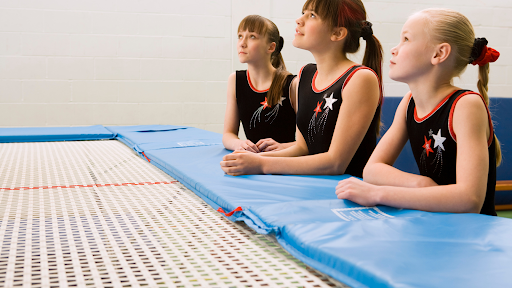Gymnastics, a sport of grace, strength, and precision, follows a structured level system that guides athletes through their developmental journey. The levels serve as stepping stones that progressively challenge gymnasts to hone their skills, fitness, and confidence. Each level is designed to match the age and ability of the athlete, allowing them to master fundamentals before moving on to more complex maneuvers. The level system fosters a safe learning environment, ensuring that gymnasts are adequately prepared for the physical and mental requirements of the sport as they advance.
At GMGC, we have a variety of classes suitable for any age group! If you want to get your child started on their gymnastics journey, visit our website today to learn more!
Age Groups And Levels
The GMGC Level System currently includes five age groups that correspond to the age of the gymnast. The levels range from Pre-School, for athletes aged 3-6 years old, through Level 5/Diamond, which is intended for advanced junior elite and competitive gymnasts.
Preschool Age Group
The Preschool age group in gymnastics, encompassing children aged 3 to 6, is a pivotal stepping stone in the gymnastics journey. It’s a phase where basic coordination, balance, and foundational gymnastic skills are introduced in an engaging, fun, and safe environment. This stage is not merely about gymnastic skills but also about instilling a love for the sport and fostering early physical literacy.
Children in this age bracket are introduced to the joy of movement through games, activities, and basic routines that incorporate the fundamental elements of gymnastics. Basic skills such as forward rolls, cartwheels, and handstands are often the focus, along with an introduction to apparatus like the balance beam and bars. Additionally, toddlers learn the importance of strength, flexibility, and discipline, laying the groundwork for more advanced skills as they progress through the levels.
School-Age Group
The school-age group in gymnastics typically includes children aged 7 to 12. This stage plays a significant role in the gymnastic progression, building upon the foundation laid in the preschool years to introduce a more structured and detailed approach to training. During this period, gymnasts start to develop more advanced skills and combine them into routines, further enhancing their strength, flexibility, balance, and coordination.
Children within this age group are grouped into various levels based on their skill proficiency, ranging from Level 1 to Level 5.
Level 1 gymnasts focus on mastering fundamental skills such as cartwheels and round-offs, as well as basic vault skills and jumps on the beam. As they move up the levels, gymnasts learn more advanced skills, such as back hip circles on the bars at Level 2 and handstand forward rolls at Level 3. By Levels 4 and 5, gymnasts are performing more complex routines that include multiple flips and somersaults on both the floor and the beam, as well as vaulting and bar routines.
Pre-Teen Age Group
The pre-teen age group, also known as recreational gymnastics, typically includes athletes aged 12 to 14. At this stage, the focus shifts from mastering skills to refining them and developing greater artistic expression. Gymnasts learn how to link multiple skills into intricate routines that showcase their strength, grace, and flexibility. The level system is also more competitively oriented at this age, with gymnasts competing against each other to rise up the rankings.
Levels 1 through 3 serve as a transition from the school-age to pre-teen levels, with an emphasis on refining skills and learning new ones such as tumbling passes on the floor and releasing elements on bars. Gymnasts at Levels 4 and 5 are expected to perform complex routines that demonstrate both skill and artistry. These advanced gymnasts are considered the top level of their age group, competing in pre-elite and elite competitions.
Teenage Age Group
The teen age group in gymnastics typically includes athletes aged 14 to 18. This level is where competition and performance become the primary focus, with an emphasis on mastering skills and linking them into complex sequences. Gymnasts at this stage are expected to demonstrate a high degree of skill and artistry as they compete against each other in regional, national, and international competitions.
Levels 1 through 3 serve as the foundation for teenage gymnasts, with an emphasis on mastering vaulting, tumbling skills, and bar routines. Level 4 and 5 gymnasts are at the peak of their age group, performing complex routines with intricate moves such as double back flips on the floor and full twisting dismounts from bars.
Transitioning Between Age Groups
As gymnasts progress through the age groups, they may find it difficult to transition from one level to another. This is because each level and age group requires a different set of skills and techniques that must be mastered in order to move up. Additionally, more rigorous training schedules and higher levels of competition can cause anxiety and stress for some athletes as they adjust to the demands of the next level.
GMGC provides guidance and support to help gymnasts transition between age groups, ensuring that they are adequately prepared for the physical and mental challenges that come with advancement. As such, coaches provide comprehensive instruction and feedback during practice sessions, helping gymnasts develop a better understanding of the skills required at their current level while also preparing them for the next level. In addition, GMGC provides resources such as practice videos and tutorials to help athletes improve their technique.
Benefits Of Age-Appropriate Progression
Gymnastics is not just about mastering skills and winning competitions; it’s also about learning life lessons and developing essential skills. As such, gymnasts benefit from an age-appropriate progression that allows them to gradually build their strength, flexibility, and coordination while gaining confidence in themselves.
Safety First
Age-appropriate progression also helps ensure the safety of the athletes. For example, preschoolers are not expected to attempt skills that would put them at risk of injury, while teenage gymnasts must be properly trained and conditioned before attempting more difficult moves. Additionally, preventing young children from competing at more advanced levels allows them to focus on mastering fundamental skills without feeling overwhelmed by competition.
Skill Mastery And Foundation Building
By progressing gradually through the age groups, gymnasts are able to master fundamental skills more thoroughly. This is especially important for the pre-teen and teenage age groups, where the focus shifts from mastering skills to refining them and creating routines that demonstrate skill mastery as well as artistry. Additionally, mastering basic skills at an early stage sets the foundation for better performance at later levels, as more complex skills build upon the fundamentals.
Physical And Mental Readiness
Gymnastics requires a high level of physical and mental fitness, which can be difficult for some athletes to achieve. Age-appropriate progression allows gymnasts to gradually build their strength and conditioning while also improving their focus and discipline. This, in turn, prepares them to compete at higher levels with confidence.
Consistent Development And Motivation
Age-appropriate progression also allows for consistent development over time. This helps to keep gymnasts motivated, as they can track their progress and enjoy their successes as they move through the levels. Consistent development also encourages athletes to set realistic goals and strive to reach them while continuing to improve their skills.
Preventing Burnout
Age-appropriate progression prevents burnout, which is a common problem among gymnasts. By taking things one step at a time and gradually building strength, flexibility, coordination, and artistry, athletes are able to keep up their enthusiasm and energy as they progress through the levels. This encourages them to stay motivated and continue enjoying the sport.
Tips To Tackle Challenges
Gymnastics can be a challenging sport, and age-appropriate progression sometimes presents new obstacles that must be overcome. Here are some tips to tackle these challenges:
Patience And Encouragement
Gymnasts should be patient and encouraging with themselves as they learn new skills. It’s normal to make mistakes or feel overwhelmed at times, and having patience and self-encouragement can help athletes stay motivated and keep progressing.
Time Management And Self-Care
Gymnasts will also practice good time management and self-care, as this will help to ensure that they have enough energy and focus for their training sessions. This may include getting enough rest, eating nutritious meals, and establishing a consistent practice routine.
Balancing School And Gymnastics
Gymnasts should strive to balance their school and gymnastics commitments. This includes setting aside time for academic studies and ensuring that the amount of time spent on gymnastics does not interfere with schoolwork or other important activities.
Mental Resilience
Gymnasts should develop mental resilience. This is essential for success in the sport, as setbacks and losses can often lead to feelings of discouragement. Mental resilience will help gymnasts stay positive and motivated even in the face of adversity. Tackling these challenges with determination and resilience will pave the way for successful progression through the different age groups.
Social Interaction
Build a positive team environment where gymnasts can interact and support each other. This will help to create a sense of camaraderie and promote healthy communication within the team. It will also provide an opportunity for gymnasts to learn important social skills as they transition between levels.
Start Your Child’s Gymnastics Journey With GMGC Today!
At the GMGC, we provide a safe and supportive environment for gymnasts of all ages. With age-appropriate progression in place, athletes are able to gradually build their skills and master each level at their own pace. Our coaches provide comprehensive instruction and guidance to help gymnasts reach their goals while learning essential life lessons along the way. Our experienced coaches will help your child find success in the sport while also providing an enjoyable and memorable experience. Contact us today and take your child’s skills to the next level!


